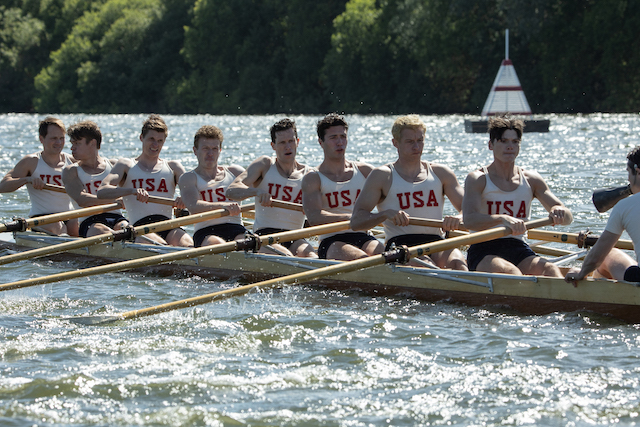
Synopsis : The Boys in the Boat is a sports drama based on the #1 New York Times bestselling non-fiction novel written by Daniel James Brown. The film, directed by George Clooney, is about the 1936 University of Washington rowing team that competed for gold at the Summer Olympics in Berlin. This inspirational true story follows a group of underdogs at the height of the Great Depression as they are thrust into the spotlight and take on elite rivals from around the world.
Rating: PG-13 (Language and Smoking)
Genre: History, Drama, Biography, Sports
Original Language: English
Director: George Clooney
Producer: Grant Heslov, George Clooney
Writer: Mark L. Smith
Release Date (Theaters): Wide
Runtime:
Distributor: MGM
Production Co: Metro-Goldwyn-Mayer, Spyglass Media Group, Smokehouse Pictures
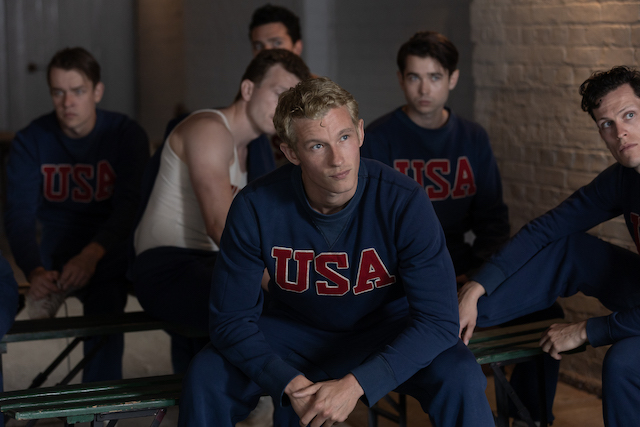
THE BOYS IN THE BOAT An Amazon MGM Studios film Photo credit: Laurie Sparham © 2023 Metro-Goldwyn-Mayer Pictures Inc. All Rights Reserved.
Press Conference with Director George Clooney, Actors Joel Edgerton, Callum Turner, Hadley Robinson and Producer Grant Heslov
Q : You know, I’ve seen a lot of sports movies, you know, all kinds. Rowing is not that popular among sports movies. It’s kind of hard to think of movies that center around this.
Yeah, and it’s a challenge, too ‘cause you’re working on water. You’re doing all of these things that aren’t that easy from a director’s point of view, I think.
GEORGE: They haven’t been very many. That’s for sure. I just think it’s not necessarily. It’s a little like F1 in a way, which is you can’t see speed from far back. You have to be up close. And so, it doesn’t look as exciting when you’re watching it from far away. So, we had to come up with a math to make the rowing energetic and exciting, which we had to figure out.
Q : This was a best-selling book, true story, obviously. 2013 it was written, and it became a New York Times number one bestseller. But I think it took a little bit of time, Grant, to get to the screen. There were others involved and rights and all sorts of things.
GRANT: Yeah, this was a book that, when we first read it, when it first came out, we chased it. And we didn’t get it, which is sad.
GEORGE: We’re still mad about it.
JOEL: Do they know that you made the movie yet?
GRANT: No. No.
GEORGE: No, we haven’t told anybody. One of ‘ems in jail.
Q : Don’t tell ‘em.
GRANT: So, cut to a couple years ago, George and I made a new deal over at MGM, and we were going through material that they owned. And they had this. And so, we thought, “Well, now’s our chance.” And that was it. We just love this book. Dan Brown wrote this. It’s a spectacular book, and I think we made it into a great film.
Q : It’s so important. It’s not just about rowing, obviously. It’s not about that. It’s about these guys, this scrapy team. They’re poor. They’re coming up in the Depression. They’re basically doing this to stay in college. And all of that. And basically, survive, which is an interesting kind of theme to deal with here. Particularly in 1936 when, you know, around the time when this is set.
GEORGE: Yeah, it’s a Depression-era story, and we’ve seen those a lot. The truth is, you know, Washington was such a new state, was such a new part of the world that the idea that rowing was even on the map compared to these other sort of legacy schools.
Q : And so, the fun part was that these young men, out of necessity, out of hunger, out of having nothing else, too, they were lumberjacks. They got together and, you know, it’s sort of like The Beatles, you know? You put together a group of men who actually could be good enough to win the Olympics, you know? It’s like getting, when your third-best songwriter is George Harrison, you know? It’s sort of a magical group. And it’s sort of what happened with these guys, was they ended up having these incredible men who worked as an incredible team. Yeah. You like adapting books. I mean, and working on material like that: Tender Bar, other things that you’ve done recently as a director. What is it about?
GEORGE: I don’t know. We’re just always looking for good stories, you know? I think the first one we adapted, you and I adapted together, was Ides of March from a play called Farragut North. I think that it’s fun to see, you know, when you can see how they’ve written the book or the play. It’s always interesting to try to find a way to make it a film ‘cause it’s very different storytelling.
Q : Yeah, it’s interesting. Well, you put together a great cast, you guys, here.
GEORGE: Well, we did the best we could with what we had.
Q : But you wound up with these guys.
CALLUM: Everyone else was unavailable.
Q : Ah! Well, let me start with you, Callum, because this is a terrific job, by the way. But this is not easy, if you’re a rower. I think I do this in the gym, this kind of rowing machine. It’s gonna kill me. But to do this is unison, with nine guys there. Had you had any experience in this?
CALLUM: None of us had actually. And we turn up in February, and we get on the river. And it’s snowing. And we’re all in the tight shorts and freezing cold and have no skill at being in the boat. And after about three weeks, George and Grant come down to have a look and check in on us. And [makes noise] we weren’t in a good place. And I could see the pain behind the smile on George’s face. [laugh]
GRANT: That wasn’t pain. That was fear.
CALLUM : Yeah, and we were worried, too. But that, I mean, we had to learn, one, how to learn a new skill. But then, also be in unison. I think that’s the hardest part about rowing is that you all have to be in complete unison. There’s no, like, hiding. And if one person is out by a millimeter, the boat suffers.
GEORGE: Listen, they trained all together for almost every, single day for five months —
CALLUM: We did everything. We ate together. We, you know, went out together. We, you know, exercised together. We didn’t sleep together. [laugh]
GEORGE: That’s the lawsuit that we’ll be doing, dealing with later.
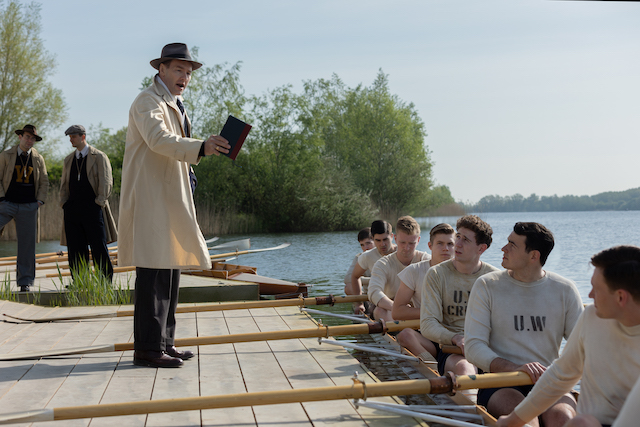
© 2023 Metro-Goldwyn-Mayer Pictures Inc. All Rights Reserved.
Q : Well, this is in the heart of the Depression, in the ‘30s. You’re playing Joe Rantz, a real guy here. What kind of research do you do to get into that role?
CALLUM: Yo, I mean, a lot. The book is so rich, and the story’s so true. It’s a really beautiful, you know, underdog story. And I think the thing that got me was the moment where he comes home from school one day, and the car’s running, and stepmother’s in the front, brother and sister are in the back. Everything’s on the top, and his dad’s on the porch. And he says, “Where are we going?” He was 13 years old. And his dad says, “We’re going. You’re not.” And he was left to fend for himself. And I just think it’s remarkable what he was able to achieve with his life. And I loved him from that moment and wanted to represent him.
Q : Yeah, he lived until 2007, I think, too.
CALLUM: Yeah. And with Joyce, too, you know? This is a true love story. And with The Boys in the Boat, they rowed once a year, every year for 50 years.
Q : Yeah. Isn’t that amazing?
CALLUM: It’s wonderful.
Q : That background’s amazing. And Joyce, by the way, this is Hadley, who’s working a lot in sports movies. Yeah, Winning Time on television.
HADLEY: Right.
Q : You played Jeanie Buss. But how did you find playing somebody from that period in this story?
HADLEY: I loved it. I love a period piece, and you know, this is a really interesting time in history. And these people are pretty much destitute and really struggling to make ends meet. And both of them, you know, Joe and all of his teammates, but also Joyce. And they’re all working to put food on their plates, and yeah, I loved working in this time period. I think it’s, like, finding, like, the hope and the light within these people, even though they’re going through so much.
I think it’s just, like, they have such high hopes, and they need to have light because they’re in this situation. And yeah, I think probably one of the most interesting time periods to kind of delve into. Even when it comes to character study. Yeah.
Q : Yeah. And, Joel, another great performance from you. I love seeing coaches like this guy, you know? I mean, he really is an interesting three-dimensional character going on here. He’s not just a, you know, stereotype.
JOEL: I just loved when I first talked to George and Grant about the script, you know, and read the script that it was described as one of those coaches that I think we’re all familiar with, who seems to drive zero pleasure from his job. [laugh] I always look at these coaches and think, “Wait, why are you even doing this? Like, you know, you’re coaching your way to an early grave.” nd I started to really realize that behind the sort of angry, blustery, red faces, they’re often, and grimaces, are just guys who care too much.
And that it reminds me of, you know, the relationship between fathers and sons. Coaches are like dads to me. I had so many coaches in my illustrious, failed sports sort of attempt, who were just like tough dads. And I really wanted to please them. So, you know, I was really excited to play the coach and excited to not have to go through what Callum went through. Because you’re getting older.
CALLUM: Joel did a little rowing. ou did some rowing, though, no?
JOEL: I did a little bit.
GRANT: Yeah, we cut that out.
JOEL: Yeah, we cut it out. Not because it wasn’t good.
GRANT: No, no, it was very good. [laugh]
GEORGE: I have to say something also, though. Joel’s a ballsy actor, right? And it takes a lot of nerve to not try to cop out and show too much, show that I really care. And you remember what, like, Danny DeVito in Taxi. He played a jerk. And he never sort of cheated it. He never all of the sudden was kinda nice. And not that you played a jerk, but you know, you never gave us the idea, for such a long period of time anyway. You weren’t always going, don’t worry, I really am a good guy. You let us get in slowly. And you know, it takes a lot of nerve as an actor. I remember, the studio would call after dailies and going, “Why is he so mad? Why is he so grumpy?” And I was like, “Relax.”
JOEL: I always feel like there’s been men in my life, you know, that aren’t an essay of words of love. But when they just put their hand on your shoulder or something in a look or just one or two words can make you feel incredibly valued and incredibly loved. And I think that that’s what we were going for with this. And it was in the script, so I was really just doing my job.
Q : Grant, I have to ask you about the production design here, ‘cause there is a scene where the boat is finished, and it’s so beautiful. I mean, these boats that you’ve created here. And the camera captures them and I’m going, like, whoa. These are a nice piece of work here. Did you do that from scratch or did somebody just have these boats?
GRANT: No, we had to build all the boats. So, you know, those old boats are made out of wood and they’re incredibly heavy. And so, these boats were made out of fiberglass to look like wood. But I mean, we had to make about 25 boats.
GEORGE: So, those weren’t all wood. But their boat was wood.
CALLUM: Yeah, which made it a lot harder. When the rowers who we trained with got into out boat, they couldn’t believe it, you know?
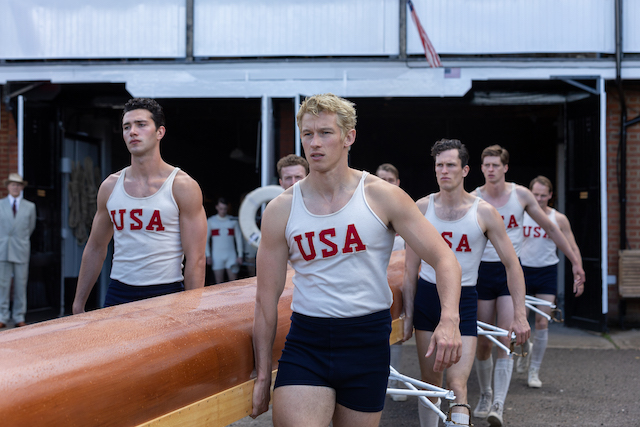
© 2023 Metro-Goldwyn-Mayer Pictures Inc. All Rights Reserved.
Q : Really?
CALLUM: Yeah, because the fiberglass boats, they’re clean, you know? They zip through the water.
GEORGE: And the oars are fiberglass, too. So, yeah.
Q : Wow. So, this was difficult, more difficult than the real [overlap].
CALLUM: Yeah, it was one of the most grueling experiences I’ve ever had in my life. It really was. And but these guys, they set us up to succeed, you know? They really gave us everything. And they gave us an Olympic gold medal-winning coach. You know, and our physios and therapists and nutritionists.
Q : Acting as consultants that you were dealing with here?
CALLUM: Yeah, exactly, to teach us how to do it.
GEORGE: Yeah, it was like a wagyu beef. We were fattening ‘em up with all the things just to kill ‘em later.
CALLUM: Yeah. And they did. The last two weeks with the races. We just had to build towards that moment.
Q : It is said a director will never ask an actor to do what he won’t do himself. So, how adept would you be behind an oar? And if you could be an Olympian, what sport would you bring home the gold in?
GEORGE: Darts. Well, first of all, that is such a bullshit thing, a director wouldn’t ask an actor to do something he wouldn’t? That’s all directors do. Yeah, go jump in that mud. Go hop off the building. They’re like, yeah, yeah, yeah, go do that. Listen, you know, I grew up in sports, too. I really loved being an athlete. But I mean, I stood next to these guys, the actual Olympic rowers and they took a picture. I’m five, 11, and I look at [the cox?] in it. The picture, literally, I’m like, looking at these mountains. It’s just a different level of athletics.
And these guys did an amazing job because, you know, people who know rowing, they got up to 46 stokes, which is what the Olympic team was doing. They didn’t do it for quite as long as the Olympic team did it, but it doesn’t matter.
CALLUM: We did it for about four seconds.
GEORGE: That’s all right. It’s called film.
GRANT: That’s all we needed.
CALLUM: There was a euphoric feeling when we did that because we were aiming towards that. And there were so many moments, you know. You’re learning a new skill, and one as difficult as this, but you just don’t think you’re gonna make it.
And to actually do it was, you know, a wonderful thing. And you’re doing it with eight other people. It’s remarkable. And the last row that we had was a special feeling, too, when we rowed back in and we rowed in slowly, you know? It was the last time we were ever gonna be in the boat together and we’d achieved something.
GEORGE: And they all put on 70 pounds afterwards, too.
CALLUM: I think it was about 80, 90.
GRANT: I was waiting to see if she opened up her mirror, like, you know, Jabba the Hut. You know, about that, though, doing it all together, and what you have to do with rowing, it’s almost unlike any other sport, ‘cause you are in unison and it’s working as one.
As, like, right at the end of the movie, you see him say that. And I think that’s a great message for right now in a very divided world we’re in, that we can all work together and we can all be one. I think that’s one of the underlying things that this movie brings out.
CALLUM: Absolutely. And it’s just inherent in Joe, you know? In the beginning of the book, Dan says that he’s asked to write the book about him. And he says, “No, I don’t wanna write the book, this can’t be about me. It’s gotta be about the boat, you know?” And I do feel that, you know, we’re the actors, but I really feel that this film is about the boat and what the boat goes on to do.
It’s a special thing that we were able to do together. Reading the book in prep was one thing. I felt like I understand it. And I’ve been rereading it for the press, and it’s just so much more profound. It’s truly a remarkable thing.
Q : For Joel, Callum, and Hadley. Unfortunately, the real-life counterparts to your characters have all passed on. How did you go about researching who they were, their stories, and their mannerisms. ou mentioned some of that, but maybe your creating some for the character here and dealing with it. Let me start with you, Joel, in talking about Al’s story.
JOEL: When I first spoke to George and I looked at photos of Al, it was like I was staring at my grandfather, my Dutch grandfather. And not that that gave me any roadmap as to how to play the character. He would be terrible with my terrible Dutch accent.
But you know, it was more about reading the book and understanding the essence of that guy. And you know, whenever I hear about actors playing really, really super famous icons, I’m always like, “Good luck,” you know?
And hats off to them when they do it really well, and most people have in recent years. But someone like Al is a real guy that nobody on the street really knows about. So, there’s a certain, you know, amount of room to just create the coach that suits this film the best, rather than feel like, you know, his great-great-grandchildren are gonna come and kick me in the shins if I don’t get rid of my lisp or something.
GEORGE: You know, we’ve met some family members and they all felt that, because one of the things you talked about when we first started doing it, was that stoicism and how sort of silent these things were. And the families of Al that we met all said that that was an element that they really appreciated.
JOEL: Yeah, and when you look at still photos of someone, that can teach you a lot. It looked to me like he had these troubled looks that were looking into the future. Like, you could see his cogs turning in a picture. And so, for me, it was really just about, how do I relate to these boys in a way that’s sort of tough love. But no, I wasn’t trying to pay homage to anything in particular because there wasn’t a wealth of information. You know, it’s just a little bit beyond our reaches of recordings that we can access.
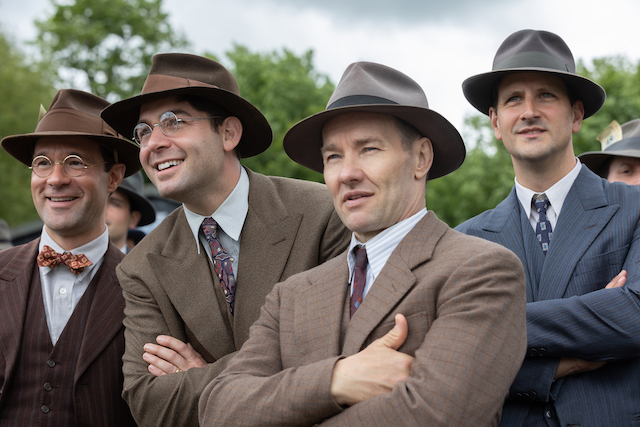
© 2023 Metro-Goldwyn-Mayer Pictures Inc. All Rights Reserved.
Q : And Hadley, what about Joyce? What do you pick up there? You know, you read the book and all of that, but what stuck out for you?
HADLEY: I think it was a similar journey, actually. And there’s so much you can take from just a single photo. And there’s one photo of Joe and Joyce sitting on the ground and I think Joe had just proposed to Joyce. I think he, like, pretending to be picking clovers and then he had a ring in his hand instead.
And there’s this look of just, like, pure joy, but just a little bit of mischief in there. And I’m like, ooh, I wanna capture that feeling. And I think, you know, Joe is kind of shy. And Joyce is kind of his counterpart or antithesis, which I think is pretty interesting, ‘cause in life, I think I’m more of the shy one and Callum’s very boisterous. So, that was interesting to find together. [laughs]
CALLUM: I don’t know about that.
HADLEY: [laughs] But yeah, it was a similar journey. There’s so many beautiful passages in this book that I kind of directly stole from. Like, the first moment she sees Joe on the bus, she says he’s like sunshine and it’s like looking through a window at sunshine. And I wanted to put that into the relationship then, just these beautiful poetic moments which I really leaned on pretty heavily.
GEORGE: I have to say also, just quickly about Hadley, the actress, you know, it’s a tricky thing to do. First of all, it’s a period piece, which is a different style of acting. You know, you’re not talking about your emotions. You know, we have to see them. We have to see the relationship between these two.
And Hadley’s the kind of actress that you can really lean on for those kind of things. I’ve been lucky enough over the years to work with some young actresses sort of when they were just hitting their stride. Shailene Woodley and Anna Kendrick. And you know, Hadley has all of these same qualities, which is she knows exactly what’s required. You know, like we’ve said, there isn’t a bunch of film of Joyce talking.
It was 1936, and by the time they were interviewed and talking, they were much, much older. So, she had to create a lot of this. And what she took from the book and then, just whatever she figured out to make that character so whole. There’s moments in this film like when you say, “I think I should tell you I love you.” And he doesn’t really register it, and he walks away. And there’s a million ways to play that. And the hardest part and the way to play it is to make it still okay. Not the victim, not hurt.
Just like, you know, we’re gonna be okay. And then when he comes back, it pays off. And it’s such a fine line. And when I’m sitting in the editing room, it makes life so easy when you’re working with an actress of her caliber.
HADLEY: Thank you, George. Thank you.
GEORGE: You’re welcome.
HADLEY: There was also great direction, though.
Q : How ‘bout that, huh?
HADLEY: Yeah. That moment, though, you helped me get to that moment. So, I mean, I think you should take some credit.
GEORGE: That was our Covid day. ‘Member, everything who shot that day got covid.
HADLEY: Oh no. [laughs] Oh no.
GEORGE: Yeah, didn’t you go down first?
HADLEY: Yeah, I think that was my fault.
CALLUM: That was your first of [overlap].
GEORGE: No, that was a pickup. We had to shoot this. I was directing from an iPad in home, in bed.
Q : Oh, my gosh.
GEORGE: Do it again. Which by the way, I think I’m gonna continue to do.
Q: It’s not easy directing from an iPad. How did you decide on the casting, and especially Callum? Was there a big process on this?
GEORGE: How did you guys decide on not having Elizabeth here in the room interviewing us? We love her. Hi, Elizabeth. Wait, how did I decide on the casting? Well, lucky enough, there’s a lot of jokes we could make, but the truth is, we got everybody, the first people we wanted to work with us. You know, Grant and Joel and I have been trying to work together for a long time. We had the Yankee Comandante we tried to do together. And we’ve been trying to find something to work together for a long time.
Hadley came in and read and the minute she read, you know, we sent it off to the studios and said this is the right person. And then Callum was the one actor that we thought would be, you know, a perfect Joe Rantz.
CALLUM: I was waiting for the joke there.
GEORGE: I was gonna do it. I was gonna do all the ones like, we went through 20 and, you know, all of it. But the truth is, it’s early in the morning, I’m feeling sort of generous. We saw, you know, it was all on tape, the auditions. And you know, you kinda watching and watching. And then we saw his and we just looked at each other and said, “Yeah, that’s the guy.”
Q : And the rest of the casting, all the crew, all the guys, they’re all different. They all pop off the screen in their own way, you know?
GRANT: And it’s challenging because they had to be the right size, you know? They had to be tall enough and believable as rowers.
GEORGE: We literally said to them, on the tape, we just said, “Are you athletic?” And we said it like, “Look, this is really important, because if you’re not, we’ll have to fire you.” ‘Cause we’re not gonna be doing head replacements and things like that, so this is it. And luckily, they all were incredibly athletic.
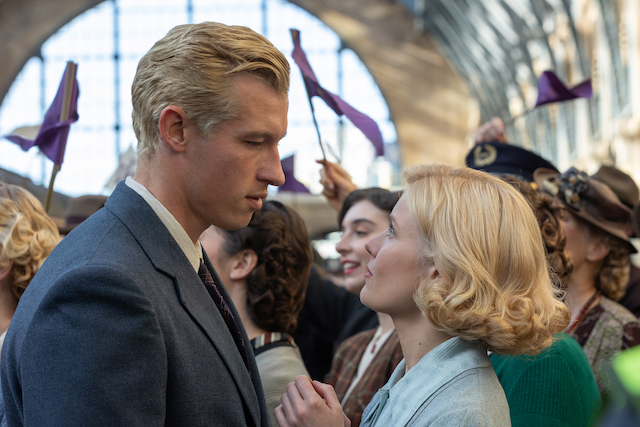
THE BOYS IN THE BOAT An Amazon MGM Studios film Photo credit: Laurie Sparham © 2023 Metro-Goldwyn-Mayer Pictures Inc. All Rights Reserved.
Q : When you were coming up as an actor and director said, what would you say?
GEORGE: Are you athletic? Well, ‘cause I was athletic.
Q : Let’s say if they say…
JOEL: Can you breathe fire riding a horse with your eyes shut? And you’re like, I can do it.
GEORGE: By the way, if there’s any actors watching this, you know, on your resume, it’ll say special skills. And you always do, every dialect, I do. And I ride horses.
JOEL: Unicycle.
CALLUM: Juggle.
GEORGE: That’s right. Juggle. And it’s always just bullshit. You just lie through that. And then you get the job and you have to learn it really quick.
JOEL: You know, there’s that aspect, and I’ve been through it before, where you know, there’s certain jobs you can fake. And you know, as an actor, you’re approaching a story and you go, well, I could fake that. I could turn up on the morning and learn one or two things and I can sell the trick.
But there are some things like this that you just can’t fake, unless the studio is willing to pay a gazillion dollars in face replacement and all that stuff. But watching these guys go through it, and together, and watching the evolution, watching them change in the way that they worked together. And their physiques changed and they looked like rowers and they worked like rowers.
And it added this dimension which happens with those scenarios after months, where they galvanized as a group and had relationships that really suited the film. And it was a real pleasure to watch that from the outside and watch that evolution. And I just remember thinking, through all that pain is gonna come so much benefit for the movie and pleasure for them having been through the experience. And it was very impressive.
Q : Amazing. Okay, from John Flynn at Row2k.com. I don’t know, is that a rowing site or something? For George, it looks like some of the cinematography, like the shots of the coxswain in the boat during the race, were an homage to Leni Riefenstahl shots in Olympia documentary. Did you draw on her work and the actual event in planning those shots or others in the film and on other rowing films when thinking about how to capture the sport?
GEORGE: Well, yeah. You know, we like to use Nazis whenever we can for filming. There is that shot of them leaning into the frame that she did in the boat. Yeah, that is certainly an homage, if that’s the word we wanna use.
GRANT: I think steal is a better word.
GEORGE: Stealing is better word. What we learned from other rowing movies in general, and it’s no knock on them. It’s been a long period of time and there haven’t been very many, is the things not to do. ‘Cause it’s hard. You know, the oars are, you know, 15 feet long. And then the boats are 40-some feet long. So, you can’t get close to the boats with the camera. And you can’t get side by side or ahead of the boats with your camera boat, ‘cause you’ll capsize the boat.
So, we had to come up with a design to get in tight enough to make it exciting. You have to have some foreground action in the front. You have to be on a super long lens. Meaning, we’re on an 80-foot arm on the boat with a three-hundred-millimeter lens, two-hundred-millimeter lens, down low, getting wet, trying to hold focus while you’re doing that. So, there was a ton of, like, math to try and find a way to make those things exciting. So, there was some of the films that we looked at, we looked at for what not to do.
And that’s not an insult on them. The technology didn’t exist then. But there was the idea of going, okay, we gotta get closer, and we gotta get inside the boat somehow. And that was a trick, you know.
Q : Shout out to your cinematographer.
GEORGE: Oh, Martin Ruhe is one of the greatest cinematographers in the world.
Q : Beautiful looking movie, what he’s done there.
GEORGE: He’s unbelievable.
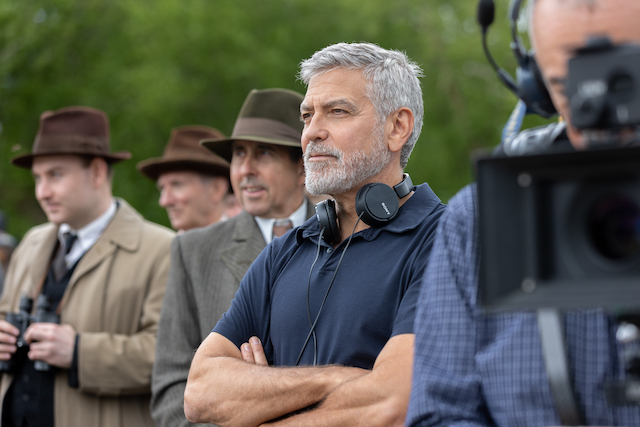
Photo credit: Laurie Sparham © 2023 Metro-Goldwyn-Mayer Pictures Inc. All Rights Reserved.
Q : How was the physical preparation of the actors as rowers integrated into your preproduction and production process?
GEORGE: Two months of training.
GRANT: It was two months of training. But then as we were shooting, we would wrap at, like, three, 3:30, and then they would go back out and row and train more.
GEORGE: We would go have a nice, like, a pinot.
CALLUM: And we would row past him.
GEORGE: Hadley and I and Grant and Joel, we would all go out, have a nice dinner, and these guys are in their short shorts.
HADLEY: I had no idea this was happening, by the way. I didn’t know. No, I would go home. Make a little supper.
CALLUM: Have a nice time in London, walking around town.
GRANT: And we scheduled it so that we shot the training stuff first, so that they could still be kind of figuring it out. And then we shot the races all in order. So, by the time we got to Berlin, they were really at the top of their game. [Even Callum?].
Q : For Callum and Hadley, Joe and Joyce have that love story that is very old Hollywood, especially their kiss at the train. Are there any couples of that time that inspired you besides Joe and Joyce, like Lombard and Gable?
CALLUM: You look at any of that?
HADLEY: No. Maybe, like, all of them combined. Not a specific. Wait, what were the movies, though? In the book, Joe and Joyce.
CALLUM: What they would go and see.
HADLEY: They would go and see, like, 15 cent movies together. And do you remember?
CALLUM: You put me on the spot there. I can’t remember.
HADLEY: I think it was, like, Ginger Rogers and Fred Astaire, yeah.
GRANT: Fred Astaire.
HADLEY: Yeah, those were the movies they would see.
CALLUM: I would look up people like Gary Cooper, you know, and how stoic he was. And High Noon was especially a great inspiration.
GEORGE: Absolutely. And Grace Kelly in that movie, too. There was an issue. Remember, she was, like, 19 and he was, like, 60.
CALLUM: That was her first movie, no?
GRANT: A lot of them were like that at that time.
GEORGE: She won the Oscar for it. Yeah, but that’s true, too. See, there’s room for me, still. I still have it.
GRANT: You can’t get away with that anymore.
GEORGE: No, you don’t. But we talked about it, remember? And we talked about this, you guys, about that kiss at the train. And I said, “This is an old-fashioned movie kiss.” You were gonna come out and he’s gonna come off the train and there’s gonna be the big score going. And I said, “So, this has to be like a 1940s movie kiss, too.” Which is, you kissed differently then. You know, you kinda mash your faces. Remember, we tried it. ‘Cause you can’t have, like, your tongue going like this.
HADLEY: [laughs] It was, like, the neck. We kind of did a spoof of it for a while, ’cause it was like, “All right, you just grab me and then I’ll dip my neck.”
CALLUM: We trained for the row and we had to train for the kiss, as well.
Q: Yeah, you trained for the rowing and you trained for the kiss. What can this film teach to today’s young people about the value of grit and determination to overcome obstacles and disappointments. Anybody? Joel?
JOEL: Well, I think you’ve summed it up perfectly. You know, one of the cool things about this film, I think, is that, you know, rowing is, like certain sports, still quite elite and something that not everyone can access. And the idea that within this story, these guys are at a school that isn’t known for this, that they’re really sort of up against it, and that they are underdogs.
And I think the idea of working hard to achieve your goal and pulling things out of yourself that you don’t think you’re capable of. And then beyond that, doing it as a group and learning to kind of move as one and move as a family, I think says a lot. And dedicating yourself to a group. I mean, does anyone wanna add something?
CALLUM: And being responsible. Being part of a team, you know, and you’re a cog in a system and you can’t let other people down.
GEORGE: And I think what you’re talking about is early, at the very beginning of this, is kind of the truth, too. Which is, you know, we’ve shown this movie and it’s like, you know, I don’t know, people are screaming and standing up in the chairs and cheering and stuff. And what you get the sense of is that, you know, this is a very polarized time in our country. Probably, you know, not since certainly the Civil War has it been this kind of anger.
It feels like it’s all the time. That’s also because we see it on television and we’ve lost perspective. This is still the fringes. Most people in our country and around the world, most people wanna get along. Most people wanna live a normal life and raise their kids and life to go well. And they want that for their neighbors, as well. And so, what we felt like with this film and coming up on Christmas was that it’s also a film that talks about the idea that we’re all in this together.
GEORGE: And probably the only way we’re gonna make it out intact is with one another and in supporting one another. And the better everyone else is is the better you will be. And so, I liked that theme for this film.
Q : I do, too. And I think Christmas Day is the perfect time to open this movie, and that’s what’s happening. And hopefully, everybody goes to see it. Thanks to our journalists out there. You did great. And thanks to you guys, too, for joining us today. Boys in the Boat’s the name of the movie. Thank you.
Check out more of Nobuhiro’s articles.
Here’s the trailer of the film.

